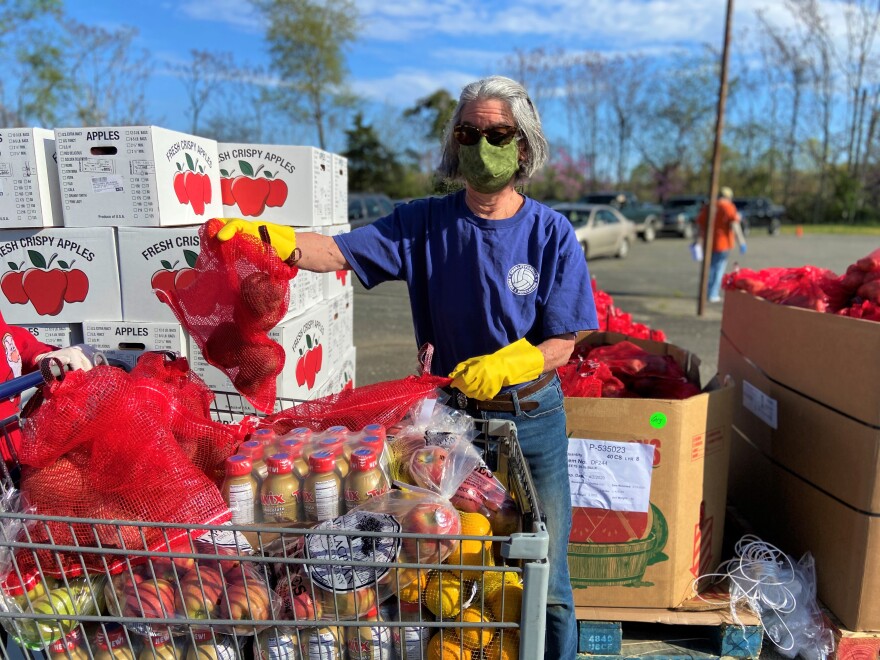Virginia's Department of Labor says the jobless rate in the commonwealth surged to more than 10% in April. The sharp rise in unemployment is creating a lot of new food insecurity. WMRA’s Jessie Knadler checks in with the Blue Ridge Area Food Bank to find out how it’s dealing with the growing demand.

The number of people seeking assistance from food pantries in the Blue Ridge has surged from 1,600 in January and February to more than 4,000 in March and April. That’s nearly triple. It’s putting a lot of stress and strain on the hundreds of food pantries, soup kitchens and shelters that receive food from the Blue Ridge Area Food Bank. Here’s Food Bank CEO Michael McKee:
MICHAEL McKEE: It’s unprecedented in the history of food banking. It’s phenomenally intense.
Granted, the situation here hasn’t been as cataclysmic as in other parts of the country where there have been mile long queues of cars lined up outside food banks because of widespread pantry closures. In those places, such as Anaheim and San Antonio, the virus hit so hard and so fast, networks collapsed.

McKEE: The virus hit our region a little later and a little more slowly than other parts of the country, which has been a real blessing. We were able to work with our community partners to adapt and make sure everyone in the community has access to enough food.
The Blue Ridge Area Food Bank serves partner agencies across 25 counties. Ninety four percent of them remain open. But as unemployment continues to rise, McKee says he’s watching the situation closely.
McKEE: We started purchasing dozens of tractor trailer loads of food to compensate for what proved to be true—a drop in donations from grocery stores.
Michelle Hess is director of agency relations and programs for the Blue Ridge Area Food Bank.
MICHELLE HESS: We’ve noticed food shortages in grocery stores have resulted in less food being available for donation to partner pantries.
Mary Scott DeMarchis of Fresh Two O Growers in Stevensburg says her organization has been donating surplus hydroponically grown lettuce to the Food Bank for a long time.
MARY SCOTT DEMARCHIS: Since we are always harvesting and packing, we need outlet for that product.
Donations to the Food Bank have increased as more of their food service clients have cut way back on lettuce orders due to restaurant closures.

DEMARCHIS: Yeah, over 5,000 heads of lettuce is what we’ve donated recently to the Blue Ridge Area Food Bank. So if you think about one box or one donation // that’s more than 5,000 meals, 5,000 families that have gotten that product.
To shore up holes in the local supply chain, the Food Bank has been relying more on federal support. The recent USDA Farmers to Families Food Box program provides increased access to dairy, meat and produce.
The Food Bank also wants Congress to expand SNAP benefits. That’s the federal nutrition program that allows low-income people to buy food using a subsidized debit card. The Trump administration was criticized in April for pushing food stamp cuts in the middle of the pandemic. Here’s Michelle Hess again:
HESS: This is not a time to be contracting SNAP benefits. We want to make sure we’re seeing legislation that bolsters our safety nets for the American public.
With so much fresh unemployment of people who may have never needed food assistance before, many of them might not even know about food pantries or where to turn for help, or whether they deserve it. Here’s Michael McKee again:
McKEE: We really want people to understand if you’re out of work or struggling to meet the needs of your family, pantries are here for you. We don’t want people holding back for any reason. No one is going to ask a lot of questions.
There are no eligibility requirements.
McKEE: We’re especially concerned about our immigrant neighbors, non English speaking … who of course have been singled out by the White House. And we want everyone to understand that everyone is more than welcome to every food pantry and at the Food Bank. We want people to feel comfortable and safe coming to food pantries in our network. That’s why we’re here.
He also says they’re soliciting food donations from the public at this time. If people really want to help? McKee says they really need more volunteers to help with all the food packing and distribution.


